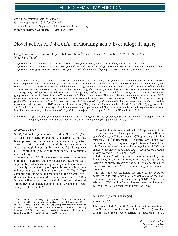摘要
The anti-allergic drug, N-(3,4-dimethoxycinnamonyl) anthranilic acid (3,4-DAA), is a synthetic anthranilic acid derivative that has been used therapeutically in Japan for many years. In this study, to investigate the effects of 3,4-DAA in allograft immunorejection model, liver orthotopic transplants were performed using inbred male Dark Agouti donors and Lewis rat recipients (allografts). The levels of indoleamine 2,3-dioxygenases (IDO) enzymic activities in five groups, allografts (control), dimethyl sulphoxide-treated group (vehicle control), 200 mg center dot kg(1)center dot day(1) of 3,4-DAA-treated group and 200 mg center dot kg(1)day(1) of 3,4-DAA+5mg center dot ml(1) of 1-methyl-D-tryptophan (1-MT)-treated group were confirmed by determination of L-kynurenine (L-Kyn) concentrations. The serum alanine aminotransferase levels in 3,4-DAA-treated rats significantly decreased compared with those in mock and control group, whereas treatment of 1-MT in allografts led to the opposite effect. Administration of 3,4-DAA reduced histological severity of allograft immunorejection, decreased serum levels of cytokines tumour necrosis factor-alpha (TNF-alpha) and interferon-gamma (IFN-alpha), and raised serum levels of interleukin-10 (IL-10), suggesting that 3,4-DAA has both anti-inflammatory and anti-immunorejection properties through IDO in immune regulation and may therefore be useful in filling an unmet need, in the treatment of allograft immunorejection.
